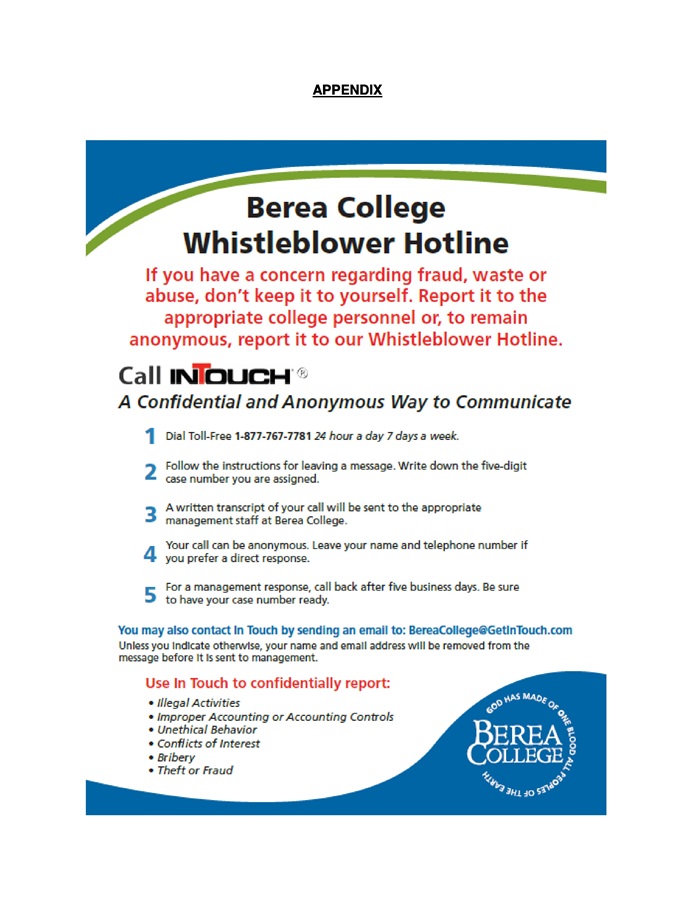Whistleblower Policy
Introduction
This Policy prohibits retaliation against an employee student, guest, or vendor of the College (referred to here as a “Whistleblower”) who reports an activity that the Whistleblower reasonably believes to be illegal, fraudulent or dishonest conduct involving College employees or resources. A copy of this Policy shall be transmitted to all College employees and students at the beginning of each academic term and displayed to the public on the College’s website.
Reporting and Investigation
All members of the College community are responsible for reporting fraudulent, dishonest, or illegal conduct involving College employees or resources. Such reporting should be made according to College policy or applicable law. If a situation is not addressed by existing College policy or if the appropriate manager or supervisor fails to act on such a report according to College Policy, a Whistleblower may report the matter in any of the following ways:
1. Anonymous Hotline:
Phone: 1 (877) 767-7781 (or) Email: BereaCollege@GetInTouch.com
Please see the Appendix for additional information and procedures related to filing an anonymous complaint.
2. Mail:
| President of the College |
|
Chair of the Board |
| CPO 2200 |
(or) |
(or Audit Committee Chair) |
| Berea, Kentucky 40404 |
|
Berea College |
| |
|
P.O. Box 2083 |
| |
|
Lexington, Kentucky 40588-2083 |
3. Phone: (859) 985-3520 (President’s Office)
All complaints shall be promptly investigated as directed by the President or the Chair of the Board. The Audit Committee of the Board of Trustees receives reports concerning all Whistleblower complaints and their disposition.
Whistleblower Protection
College employees may not retaliate against a Whistleblower with the intent or effect of adversely affecting the terms or conditions of employment, enrollment, or any transaction involving College facilities or resources. If the Whistleblower has made a confidential report, the College will exercise reasonable care to keep the Whistleblower’s identity and the report confidential, unless (1) the Whistleblower agrees to the disclosure; (2) disclosure is necessary to allow College or law enforcement officials to investigate or respond effectively to the report; (3) disclosure is required by law; or (4) the person(s) accused of violations by the Whistleblower are entitled to the information as a matter of institutional due process in disciplinary proceedings.
Whistleblowers who reasonably believe that they have been retaliated against by a College employee may file a written complaint with the President or Chair of the Board using any of the reporting methods described above. If retaliation is proven, the retaliating employee(s) are subject to appropriate disciplinary actions or remedies provided in law or equity, including dismissal. The prohibition against retaliation is not intended to prohibit administrators or supervisors from exercising legitimate supervisory responsibilities in the usual scope of their duties and based on the College’s Workplace Expectations, other institutional policies and valid performance-related factors.

Revised by Board of Trustees, April 2015